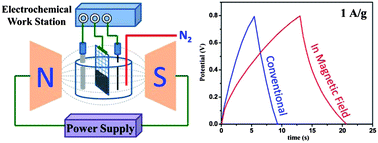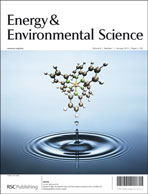Magnetic field induced capacitance enhancement in graphene and magnetic graphene nanocomposites†
Abstract
Magnetic graphene nanocomposites (MGNCs) synthesized by a facile thermal decomposition method have been introduced. TEM observations reveal a uniform distribution of the Fe2O3 nanoparticle size and preferential nuclei growth along the edge defects. Both graphene and its Fe2O3 nanocomposites are prepared as electrochemical electrodes to evaluate their capacitor performances. Under normal conditions (without a magnetic field), the MGNCs show lower capacitance than graphene due to the large particle loading (52.5 wt%), which brings larger internal resistance and thus prevents efficient electron transportation within the electrodes. However, in the presence of an external magnetic field, both graphene and MGNC electrodes exhibit significantly enhanced capacitance as compared to the results obtained under normal conditions. Specifically, the capacitance of graphene is increased by 67.1 and 26.8% at the sweeping rates of 2 and 10 mV s−1, respectively. Even larger enhancements of 154.6 and 98.2% were observed in MGNCs at the same sweeping rates of 2 and 10 mV s−1, respectively. The energy density and power density of the electroactive materials are also dramatically enhanced in the presence of a magnetic field. Equivalent circuit modeling of impedance spectra revealed that the magnetic field played a critical role in restricting the interfacial relaxation process and thus enhanced the electrode capacitance. These findings present a potential revolution of traditional electrochemical capacitors by simply applying an external magnetic field to enhance the capacitance dramatically (even doubling it depending on the electroactive materials) without material replacement and structural modification.


 Please wait while we load your content...
Please wait while we load your content...